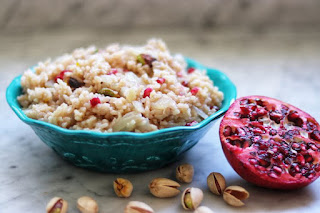Shams has brought his daughter, Sit, and her son, 'Ajib, to Damascus on their quest to find his nephew, Badr, the father of 'Ajib. Badr had been landed there by the genie and efreet, and taken in by a cook who brought him into the restaurant business.
The travelers pass the cooking shop where Nur has taken over after the old cook's death. 'Ajib convinces his tutor, a eunuch, that he wants to eat there. Even though his tutor feels the place is too low class for a vizier's grandson, they eat. Badr feels drawn to 'Ajib, who tells him that they are searching for his father. When they leave, Badr feels compelled to follow them, but 'Ajib feels Badr is being creepy and hits him with a rock.
The travelers continue to Basra, arriving at Nur's abandoned palace, where Nur's widow and Badr's mother still lives. Shams introduces himself and his family, and offers to take the widow with them back to Cairo. Along the way, they stop at Damascus. 'Ajib, remorseful at the way he treated the cook with the rock, goes to the shop with his tutor. Badr is pleased to see him, and cooks him a sweet pomegranate seed dish.*
Later, with the family at dinner, 'Ajib is not hungry, and explains that he went to the bookshop. His grandfather Shams is not pleased that he went to such a lowly place, but 'Ajib exclaims that the food there was much better than what his grandmother (Badr's mother) can cook. They insist that he bring them a dish from the cookshop, and when the tutor brings home a serving of the pomegranate dish, Badr's mother recognizes the style of her son's cooking.
[This story has many variations, especially the ending; here is a blend of several.]
Shams devises a plan to unite father and son. Shams tells Sit to arrange the bedchamber the way it was the night years earlier that she and Badr slept together, and to lay out his clothing. He has his people destroy the shop and arrest Badr for leaving pepper out of the pomegranate dish. Badr objects to the ridiculous charge, so Shams has him beaten and locked in a chest and delivered to Cairo.
The chest is taken into Sit's bedroom, where he is let out by Sit, who tells him he has been in the bathroom too long. Confused by the room and seeing his old clothing, he tells her what he has been up to; she tells him those years were a dream, but he shows the scar on his forehead made by a young boy. Sit confesses the charade. Shams enters and explains it was a test to see if he really was Nur's son Badr. He is reunited with his mother and his son, and all ends well.
This tale is curious in the 1001 Nights because it is a tale within a tale. It is told to Caliph Harun al-Rashid by his vizier, Ja'far ibn Yahya, in order to delight him and put him in a good mood so that Harun will spare Ja'far's servant who ultimately caused the murder in the tale "The Three Apples." More interesting is that Ja'far and Harun were real historical characters. We have few details about Ja'far, but Harun was quite famous, and I'll give him his due tomorrow.
*I include a pomegranate dish for the illustration, and here is the recipe.

No comments:
Post a Comment
Note: Only a member of this blog may post a comment.